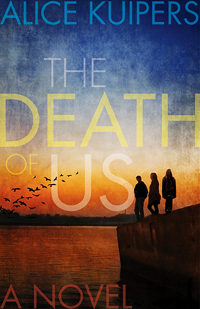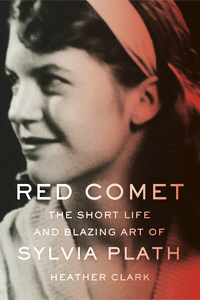Title The Death Of Us
Author Alice Kuipers
Published September 2nd, 2014 by HarperCollins Canada
Pages 288 Pages
Intended Target Audience Young Adult
Genre & Keywords Contemporary, Realistic Fiction, Mystery, Thriller
Part of a Series? No
Source & Format Received an advance reader copy from the publisher for review (Thanks Harper Collins Canada!), Paperback
Find It On Goodreads ● Amazon.com ● Chapters

A recovered friendship, a dark secret, and a love triangle with a deadly angle…
Callie is shocked when her friend Ivy reappears after an unexplained three-year absence, but the girls pick up where they left off, and suddenly Callie’s summer is full of parties, boys and fun. Beneath the surface, things aren’t what they seem, however, and when a handsome boy with a dark past gets tangled up with Ivy, the girls’ history threatens to destroy their future.

“Police and ambulance workers are pulling a car out of the river. The car is smashed up but not beyond recognition.
It’s Ivy’s car.
My stomach rolls.
It’s Ivy’s car.
Angel is frantic.
Oh man, I think. Callie.”
Callie Carraway and Ivy Foulds. Two best friends as inextricable and devoted as any two girls could be. That is until a potentially deadly, disastrous discovery and a sudden separation make it appear as though that chapter of Callie’s life has been closed forever. Lost in the wake of her best friend’s unexpected disappearance, Callie attempts to put the past firmly behind her, struggling instead with feelings of resentment and jealousy over her new baby brother, Cosmo, worry over her beloved grandmother’s failing health, all while patently ignoring the feelings that Ivy once inspired in her. Instead, she begins to spend more time with her friend Kurt, writing for their shared passion, the school’s magazine, Flat Earth Theory. For better or worse, however, the past does not remain buried for very long. Three years after leaving the quiet town of Edenville, like Dorothy being swept into Oz, Ivy returns on a tornado of secrets, lies and deception that will alter the course of Callie and Kurt’s lives forever. Now dressing only in white and tight-lipped about what has occurred since she has last seen her best friend, Ivy remains the same effervescent, enigmatic mystery with indefatigable energy that once attracted and excited Callie all those years before. As the two begin to spend more and more time together, Ivy’s attention becomes firmly rooted on Kurt, and the three teenagers are soon caught in a treacherous, unpredictable love triangle that will threaten their relationships, their sanity, and even their very lives. After all, perhaps it’s true what they say: Those who do not learn from history are doomed to repeat it.
“They’re talking about girls. About Ivy. Sure, they all want her. Blonde, sexy. Flips her hair over her shoulder when she wants me to kiss her. She’s just out of reach. Just something. The girl everyone watches on stage. Can’t help it.”
Is the complete absence of feeling in itself a feeling? What determines a reader’s level of emotional investment in a story? How does one rate a novel that is not objectively bad, but continually contradicts one’s own personal preferences and promises to leave no lasting impression? These were all questions I was forced to confront upon completion of Alice Kuipers’s The Death Of Us. An unsolicited advance reader copy that arrived with two other books I had requested from Harper Collins Canada, The Death Of Us was a novel I was initially excited about. With the promised inclusion of a recovered friendship and a dark secret that threatened to tear them apart forever, The Death Of Us sounded like a taught, intriguing psychological thriller from a critically acclaimed author who had been lauded many times before. Unfortunately, despite the highest of hopes and the best of intentions, The Death Of Us was a resounding disappointment. In truth, this novel did not inspire much of a response from me at all, be it positive or negative and therein lies the problem. As quickly as I was able to read this story and as important as the issues it examines are, I felt absolutely nothing for this book or its characters. There was no righteous indignation or gushing enthusiasm. Only a general sense of ennui. Though far from the worst novel I have ever read, stale, one-dimensional characters, a convoluted, poorly executed narrative style, and a ‘surprising twist ending’ that was anything but all coalesced to create a thoroughly unremarkable, unmemorable story that was little more than a chore to slog through and proved even more difficult to review.
“Soon Kevin pulls into the alleyway at the back of his house. Same house, same muddy alleyway, same everything. The memories rush back. Three years since we lived here and everything’s exactly the same.
Except me. I’m different.”
My problems with The Death Of Us began, but were unfortunately not limited to, the characters that inhabit it. Both Ivy and Kurt endeavour to escape their parents’ respective legacies. Ivy arrives back in Edenville with a new wardrobe, new exercise regime and a new state of mind, everything she will need for the new start she seems so determined to make. In theory, anyway. Desperate to escape her mother’s history of unrealized potential, failed relationships, unrelenting bitterness and a debilitating dependance on the bottle that makes the aforementioned even remotely bearably, Ivy can’t seem to help but fall back into the patterns from which she is so determined to break free. Kurt is a boy straddling two worlds but belonging to neither, struggling to reconcile the world of wealth, privilege and idle excess into which he has been adopted with the world of poverty and drug addiction inhabited by his biological mother, from which he has escaped. Finally, Callie is the obedient, steadfast, reliable girl determined to rebel against the rules and expectations that threaten to smother her. The perfect student. The perfect daughter. The perfect friend. The perfect teenager. All a brittle illusion. Worried about her grandmother’s failing health, jealous of her brother Cosmo’s close relationship with her mother, and struggling with feelings for Ivy that she can neither define, understand or admit to, Callie should have proven to be a complex, multifaceted character. Instead, riddled with motivations, desires and aspirations that are as changeable as the weather, it was difficult to ever feel as though I had a grasp on who these characters were. Why does Kurt begin a relationship with Ivy only to suddenly decide that his true feelings lay elsewhere? Why does Ivy pursue Kurt with single-minded determination bordering on mania while continuing to only make sexual advances toward Callie? Is she bisexual or merely manipulative? As serious and complicated as the issues that these characters are grappling with are – jealousy, insecurity, mental illness, sexuality, etc – the examination of these subjects is superficial at best. Introduced solely to create conflict amongst the characters, they are not given the time and attention that they deserve and their source, cause, and effect are left relatively unexplored. As a result, there is no baseline from which to determine character growth or a lack thereof, because the characters are so changeable and ill defined. This troubling lack of character development and authorial intent extends to the cast of secondary characters as well. Xander and Rebecca, the supposed best friends of two of our protagonists, are one dimensional and toneless, introduced once only to be subsequently relegated to the background with no apparent further development, purpose or influence on the events in the novel. They exist solely to pad out the cast and otherwise add nothing of interest to the story.
“He gives nothing away. The sound of their shoes echoes down the corridor as they retreat.
This is what it means to be alone.”
The Death Of Us is written from the first person perspective of the three main characters, Callie, Ivy, and Kurt. Kurt’s perspective remains firmly rooted in the present day, July 31st, while Callie and Ivy’s perspectives begin in the past, fourteen days prior to the events of July 31st, and then gradually progress forward in time to eventually align with Kurt’s. Herein lies one of the primary issues I encountered with this novel. While I ordinarily enjoy non-linear stories and those told from multiple points of view, I found Kuipers’s narrative style both alienating and confusing. When utilized properly, multiple points of view allow a better understanding of a character and the ability to see events from a number of different, unique perspectives. Unfortunately, Callie and Ivy’s narrative voice were nearly indistinguishable from one another. This caused a great deal of confusion as to who was speaking, and I often found myself having to refer back to the character delineations at the beginning of each shift in perspective in order to remind myself. This was all the more disappointing because the author is clearly attempting to demonstrate the stark disparity between the girls’ personalities, something which is not entirely achieved because of their muddled and often indistinct voices. Moreover, the non-linear manner in which this novel is written was jarring and never allowed me to invest in or connect with the characters. Just as I as beginning to become accustomed to the rhythm of a character’s voice and settle into their perspective, it would suddenly shift into another and I found myself having to begin all over again. Even more frustrating was the fact that the characters’ observations and narration remained largely vague in order to preserve the ‘surprise twist’ at the conclusion of the novel. In doing so, however, Kuipers never truly utilizes the benefits of a multiple perspective narrative style. She fails to offer a deeper, more personal glimpse into the characters’ psyches because their narration is hindered by a desire for ambiguity and mystery. As an indirect result, I was also constantly aware that I was reading a novel and was never able to be immersed in the story. The deliberate, meticulous, and obvious construction of events and the manner in which they were related always kept me at a firm distance. As a result, the story being told never felt organic, natural, or remotely real.
“In The Odyssey, the sailors steer the ship away from the monster Charybdis, who swallows down the waters of the sea. But I can’t steer the ship anymore. I can’t go on like this.”
Try as I might, I cannot possibly love every book that I read and Alice Kuipers’ The Death Of Us was a painful reminder of this. A contemporary, realistic fiction story about the bonds of family, friendship and budding romance with the faintest hint of magical realism and the supernatural, The Death Of Us promised to include everything I could hope to find in a novel. Given the relative simplicity of the story and the limited word count, I expected a clear, concise, powerful psychological thriller that packed a punch. Unfortunately my hopes were to remain unrealized. Ill defined, poorly developed characters with indistinct voices and muddled motivations, an alienating, poorly utilized narrative style, an uncompromising commitment to mystery and shock value at the expense of everything else and a general inability to connect with the story in any significant manner combined to make this an utterly unfulfilling, lacklustre read. While I would not intentionally deter anyone from reading this story as I do not think it harmful or dangerous in the manner I have found others books, as in the case of Lauren Barnholdt’s Through To You, it is not a novel I feel will leave a lasting impression or remain with me long after completion. That said, if the warm, largely positive initial praise for this novel on sites such as Goodreads is any indication of what is to follow, I can only conclude that I’m the wayward black sheep in this rather eclectic flock. Chin up, Callie, Ivy, and Kurt. It’s not you. It’s me.
Please Note: All quotations included in this review have been taken from an advance reader copy and therefore might be subject to change.

Overall Rating



Still not sure this is the right book for you? Why not listen to what some other bloggers had to say about it?
Please Note: I was unable to find any other online reviews of The Death Of Us at the time of this review’s publication.











